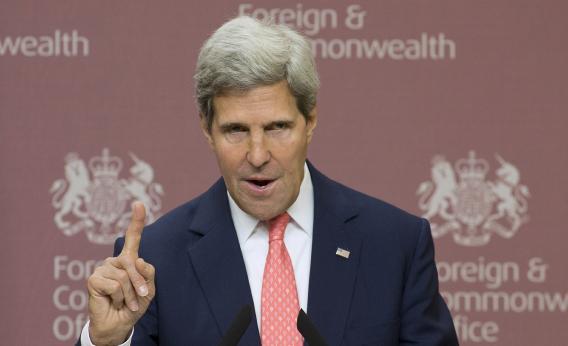Secretary of State John Kerry’s case for a U.S. strike in Syria seems to rest on two assumptions. One, that it is a crucial test for U.S. national security and the values of the civilized world comparable to the rise of Nazi Germany. Two, that it’s not really a big deal.
Over the weekend, Kerry described the Syrian government’s use of chemical weapons as “our Munich moment,” telling an audience in France, “This is not the time to be silent spectators to slaughter. … This is not the time to send a message where doing nothing is far more risky than responding.”
Today, Kerry—now in Britain—issued an ultimatum to Syrian President Bashar al-Assad, giving him one week to turn over his complete stockpile of chemical weapons, or else. Or else what?
Kerry said the Americans were planning an “unbelievably small” attack on Syria. “We will be able to hold Bashar al-Assad accountable without engaging in troops on the ground or any other prolonged kind of effort in a very limited, very targeted, short-term effort that degrades his capacity to deliver chemical weapons without assuming responsibility for Syria’s civil war. That is exactly what we are talking about doing – unbelievably small, limited kind of effort.”
I may not have much experience with brinksmanship, but it seems to me that threatening to hit someone becomes a lot less effective when at the same time you’re telling your friends, Don’t worry, I’m not going to hit him that hard. And convincing the public that this situation is analogous to the buildup to the largest war in human history is difficult when you’re also saying that an “unbelievably small” effort will be sufficient to deal with it. Given the blows the Assad regime has already absorbed over the last two years, it’s hard to imagine statements like these changing his thinking.
I realize the administration is speaking to multiple audiences—trying to play bad cop with Assad at the same time it’s trying to cajole a skeptical American public. But when the same official is playing both roles, it becomes a little hard to keep the narrative straight.
